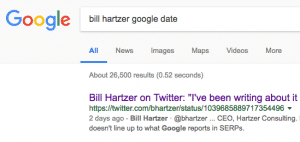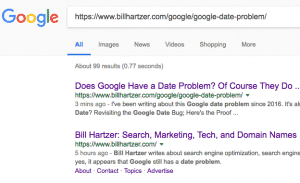
That’s a really good question. Does Google have a date problem? Well, Garry Illyes (@methode on Twitter) tweeted, kind of admitting that he doesn’t like dates. That was back on September 5th, and looking at that tweet, and knowing what he’s really referring to, yes, it appears that Google still has a date problem.
Just for an interesting experiment (and real proof) that Google does, in fact, have a date problem, I’m writing this post at 6:00PM CST on September 12, 2018. Once I post it, and it gets cached by Google (after I do a Fetch and Render), we’ll know whether or not Google still has a date problem.
I’ve been writing about this Google date problem since 2016. It’s almost two years later, and Google still hasn’t fixed this bug. Even after I have personally pointed this out to Google reps. In person more than once. Then, again via email, with specifics.
What’s the Google Date Bug?
Just to refresh your memory (or if you haven’t seen my previous posts), whenever a site posts a blog post (like when I post here on my blog or other blogs), Google then indexed the post. When they index the post and you find it in the Google search results, they report (in the search results) that it was posted “5 hours ago” or “11 hours ago” or “7 hours ago”. The time varies. But the post was made (content written) minutes ago. Not 5 hours ago.
Having a bad date or wrong time on the blog post is a big problem. Not only is inaccurate, it’s confusing for readers. In fact, it’s quite possible that I could post about “breaking news” that occurred, and it will report that I posted 5 hours ago, before the breaking news event even happened.
What would happen if I were to post about the Apple event today, releasing new iPhone models. But when you search, you see that I posted it 5 hours ago, before the event occurred! People might think that I had inside information–and it could make someone question my credibility. Well, probably not, but you get the idea.
Where Does Google Get the Date?
Well, where does Google get the date on when I posted something? I can tell you that it’s NOT the web server date or the “last modified date”. My web server’s header information is correct and up to date. WordPress has the correct time zone, Central Standard Time, listed. The PubDate on the post (in the source code) is correct. So it’s not anything that I am doing. It is not my server (even though my site does use CloudFlare).
Revisiting the Google Date Bug
The whole idea of the date issue has come up again and again over the past two years several times. I’ve spent hours investigating it, and even put in support tickets with my web host that investigated it. Yesterday, Glenn Gabe tweeted about Google date issues. I responded to him in the Tweet and we talked about it. Others talked about it, as well.
Want to laugh about it? Here’s some proof: I tweeted TODAY about the Google date issue. Then when you look at the search result for this tweet, I tweeted it 2 days ago:
So….. yeah Google has a date problem. They can’t even get Tweets right.
Here’s the Proof
Earlier, when writing this post, I figured Google would still have the date problem on posts. Well, here’s the result of that:
I went and made this post. This is the only post I’ve made today–and haven’t posted in 4 days. So, previously when I did a Google Fetch and Render, minutes later I’d see “posted 5 hours ago”. But, it does look like they (finally! after 2 years) may have fixed this issue. But, look at the home page of the site–which shows was last updated 5 hours ago.
There were 2 fetch and renders done–one for this post’s URL, and the other one for the site’s home page since it was just updated with the latest post. The home page shows “posted 5 hours ago”, when it was not.
The actual search result from Google shows the problem–with a recent post date of minutes ago along with the same exact fetch and render done within 30 seconds of the first one (but it was then updated 5 hours ago).

